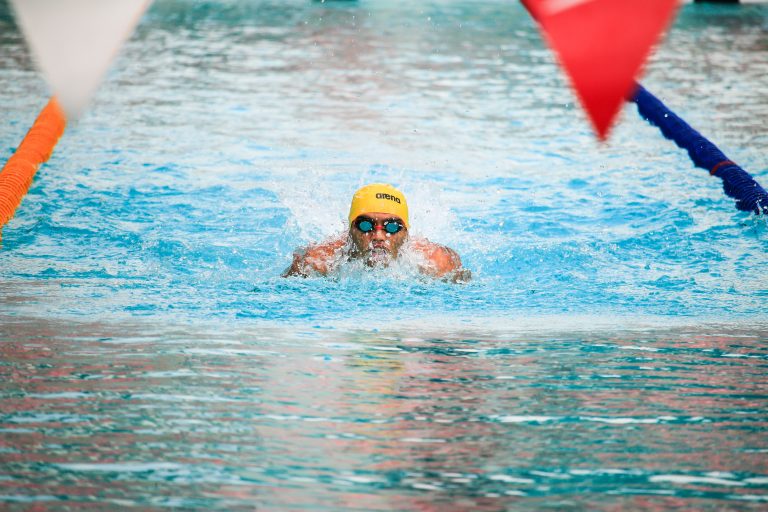This is the best time of year to find a private instructor for your child or yourself. While joining a swim club has many benefits, some people feel more at ease having private instruction and coaching.
A swim instructor can be a great resource for many reasons. You can learn at your own pace, fine-tune your technique and receive personalized attention. Maybe even make a lifelong friend. Here are some things you should consider before hiring someone.
Asking for certifications is a great way to make sure you’re hiring a qualified coach. You should also look for Red Cross certifications in Infant, Child, or Adult CPR depending on the person taking the lessons. Also, for First Aid certifications and Water Safety Instruction. This is the Red Cross’s certification for certified swimming teachers.
Ask for their technical background. Ask about their professional experience and training. How many years have they been coaching, what are their swimming qualifications? You can also ask for a reference. You will find some satisfied clients from the best coaches and instructors.
1. Motivational Techniques
You may be able to do a dolphin kick or backstroke, but you need to ensure that your instructor understands your motivations and can apply these techniques to keep you coming back for more. Discuss your coach’s style with them. Do they challenge you and help you realize your potential? You will feel more at ease with a coach who is comfortable and energized.
 2. What is the Content?
2. What is the Content?
Find out the type of lessons and content that you will be using during your swimming workouts before hiring an instructor. Your instructor should also be aware of your goals and focus. Make sure you have a plan and a method to track your progress.
Find out the expertise of your instructor. Are they specialized in working with children or not? Are they primarily working with adults? They may not be the right choice for your teenager if they are used to teaching content to 8-year olds and vice versa.
3. Personality Plus
Your child or you will likely spend a lot of time with the new instructor. Make sure there is a personality match. You may not be best friends with every person at work, and you might not get along well with every coach. This is especially true for your kid. To make sure your child feels comfortable with the instructor, meet them before the first lesson. Also, observe the first few sessions to determine if they are learning and having fun. You can also check in with your child to see how they like the sessions. It is beneficial for everyone to get their feedback early.
To ensure you have the best instructor possible, you should consider the following. Ask about scheduling, accessing pools, refunds, and rescheduling policies. Ask about rescheduling policies if you are hiring someone to care for your child. There might be academic problems that arise last minute, which could prevent your son/daughter from attending the session.
Swimming coaches have the primary job of helping swimmers reach their potential.
How can swimming coaches do this and become great swimmers?
Coaching style development
There are many types of swimming coaches. It is important for coaches to reflect on the great coaches they have had the pleasure of working with during their sporting careers. What were their greatest qualities as a coach?
A coach who is interested in coaching should spend time studying coaches from other sports via social media, TV and at their pool. They may like a certain style of coaching, but there might be things they don’t like or that they are uncomfortable with. It doesn’t matter what they like about coaching, but it is important that they begin to see the qualities they admire.
Coaching skills
Here are some characteristics that a great coach might have in common with a great swimmer coach:
- CaringA coach who is compassionate and puts the swimmer’s welfare first.
- Charisma:A friendly, open-minded and social coach.
- CommitmentA coach who is focused and committed to helping their team achieve their swimming goals.
- CommunicationGreat communicator, who can effectively communicate their swimming program to swimmers during competition and training.
- Dedication and determination:A coach who delivers excellent training sessions consistently and repeatedly.
- Honesty:Great integrity in a coach
- InnovatorSwimming coach who is always up-to-date with all the latest developments and not afraid to try new things.
- KnowledgableA coach who has a wide range of swimming knowledge.
- MotivatorCoach who inspires swimmers to achieve greater performance.
- Planner and Organiser:Swimming coach who doesn’t leave anything to chance. No matter what the task is, a swimming coach must pay attention to every detail.
- Visionary:A coach who is able to see the long-term and drive swimming development.
Your most important coaching attributes
A list of the qualities that inspire coaches is a good place to start. The next step is to put these positive attributes into practice while coaching. They should also begin to eliminate any negative attributes they have seen in coaches, or they might have developed.
They can ask a coaching colleague to observe them as they coach if they aren’t sure if they have the right coaching qualities.
Effective communication between coaches and swimmers is essential for the delivery of a successful training program.
Coaching is one of the cornerstones
An aspiring coach must not only adopt key attributes in swimming coaching but also work hard to develop key coaching skills such as:
 Swimming technique
Swimming technique
Many coaches believe that the key to a successful program is continual improvement in swimming technique.
Swimming needs to be able to perform a variety of techniques before they can compete and train effectively.
Swimming excellence should always be a cornerstone of coaching.
Communication
Effective communication between coaches and swimmers is essential for the delivery of a successful training program.
- Swimming pros often have a mixture of learning styles. However, some swimmers may have one dominant style.
- It is important that coaches who are aspiring to coach use both verbal and visual learning styles when coaching.
- Poor communication between parents and coaches is a common problem.
- Sometimes, there is gossip, rumor, and half-truths when there is a lack of information.
Commitment
Swimming programs should have a focused commitment by both the swimmers and coaches to achieve their best in competition and training.
This is why many of the top swimmers in the world set swimming goals and keep track of their progress.
Knowledge
The sport of competitive swimming is constantly evolving with new rules and techniques.
An aspiring coach can take advantage of many learning opportunities to improve their coaching skills, stay current with swimming innovations, and add variety to their training program.
Sources of swimming information
Many swimming information sources offer access to technical and experience information from top swimmers and coaches around the world.
These include blogs, websites, social media, books, and magazines, as well as DVDs, magazines, books, and DVDs.
Mentoring
Mentors are trusted and experienced swimming advisors. They can be an invaluable resource for swimming coaches.
- My own experience has shown me that I had a lot of great mentors, especially when I started coaching and was studying to become a coach.
- I’ve found that most head coaches and coaches within my club are willing to share their experiences and thoughts with others.
- Any coach should therefore establish a mentor network either via social media or face-to-face.
- A coach’s coaching philosophy is a collection of key beliefs and principles that will determine the type of coach they want to be.
Coaching philosophy
The aspiring coach will be able to create their coaching philosophy once they have a clear understanding of the qualities they admire in coaching and the cornerstones they believe are important.
A coach’s coaching philosophy is a collection of key beliefs and principles that will determine the type of coach they want to be.
This should be a key reference point as they become coaches.
 Coaching philosophy
Coaching philosophy
It is a continuous task to develop a coaching philosophy. Coaches will refine swimming lessons singapore and improve their beliefs and principles as they gain more experience and knowledge. This will allow them to be a more consistent, effective, and focused coach.
Takeaway
A swimming coach’s primary function is to share their experience and knowledge to help swimmers reach their full potential.
How can swimming coaches do this, and how can they become great swimmers?
- It is worth taking some time to reflect on the great coaches of sport and consider what their characteristics are that made them great.
- The next step is to compile a list of coaching qualities they admire.
- They should then focus on the key coaching “cornerstones”, such as communication and technique.
- They should also develop a coaching philosophy. This will help them to become a great coach.







